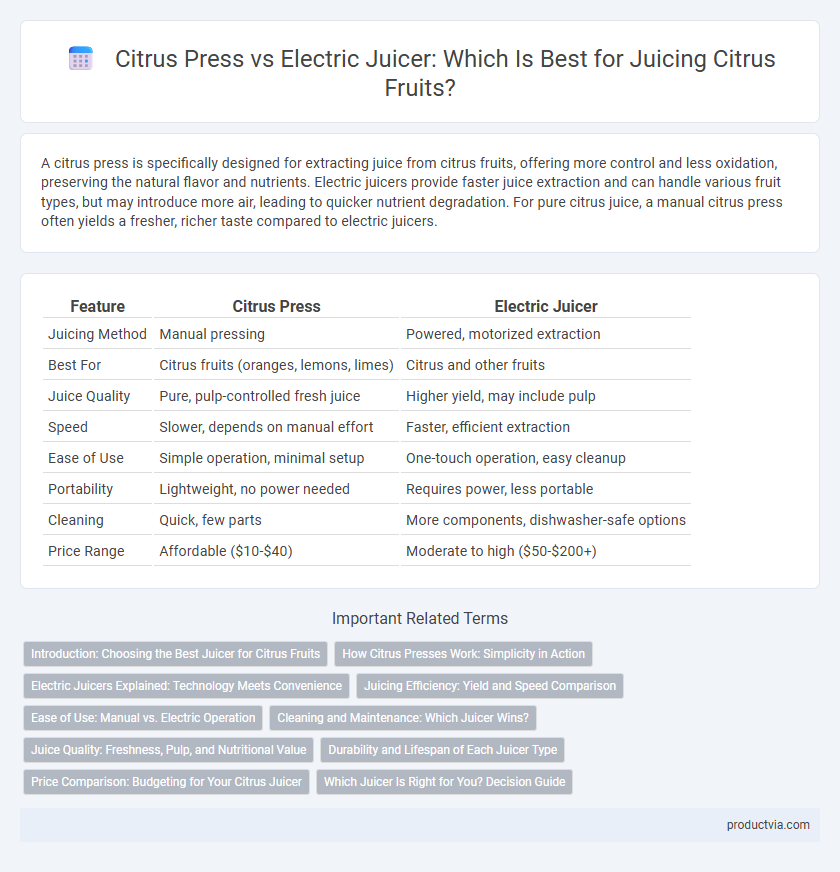A citrus press is specifically designed for extracting juice from citrus fruits, offering more control and less oxidation, preserving the natural flavor and nutrients. Electric juicers provide faster juice extraction and can handle various fruit types, but may introduce more air, leading to quicker nutrient degradation. For pure citrus juice, a manual citrus press often yields a fresher, richer taste compared to electric juicers.
Table of Comparison
| Feature | Citrus Press | Electric Juicer |
|---|---|---|
| Juicing Method | Manual pressing | Powered, motorized extraction |
| Best For | Citrus fruits (oranges, lemons, limes) | Citrus and other fruits |
| Juice Quality | Pure, pulp-controlled fresh juice | Higher yield, may include pulp |
| Speed | Slower, depends on manual effort | Faster, efficient extraction |
| Ease of Use | Simple operation, minimal setup | One-touch operation, easy cleanup |
| Portability | Lightweight, no power needed | Requires power, less portable |
| Cleaning | Quick, few parts | More components, dishwasher-safe options |
| Price Range | Affordable ($10-$40) | Moderate to high ($50-$200+) |
Introduction: Choosing the Best Juicer for Citrus Fruits
Citrus presses deliver superior juice extraction from lemons, oranges, and grapefruits by efficiently squeezing fruit with minimal pulp and bitterness. Electric juicers offer convenience and speed for higher volumes but may introduce more pulp and oxidation, affecting the juice's freshness. Selecting the best juicer for citrus fruits depends on balancing juice quality, ease of use, and intended juicing frequency.
How Citrus Presses Work: Simplicity in Action
Citrus presses operate through a manual mechanism where the fruit is cut in half and pressed against a ridged cone to extract juice efficiently, preserving the natural flavors and essential oils of citrus fruits like oranges, lemons, and limes. This straightforward design requires no electricity, offering an eco-friendly and quiet juicing experience ideal for small quantities. Unlike electric juicers, citrus presses prevent oxidation and heat buildup, maintaining the freshness and nutritional value of the juice.
Electric Juicers Explained: Technology Meets Convenience
Electric juicers combine advanced motor technology with precision blades to efficiently extract juice from citrus fruits while preserving maximum nutrients. These devices often feature adjustable speed settings and pulp control, enhancing juice quality and customization compared to manual citrus presses. Their automated operation significantly reduces effort and time, making them a convenient choice for daily juicing routines.
Juicing Efficiency: Yield and Speed Comparison
Citrus presses provide higher juice yield with minimal pulp retention, as their manual pressing mechanism efficiently extracts juice directly from citrus fruits. Electric juicers, while faster due to motorized operation, may produce slightly less juice and generate more foam, reducing overall yield. For juicing efficiency, citrus presses excel in maximizing juice volume, whereas electric juicers prioritize speed but can compromise extraction quality.
Ease of Use: Manual vs. Electric Operation
A citrus press requires manual effort, making it straightforward and low-maintenance but potentially tiring for frequent juicing. Electric juicers offer hands-free operation with consistent power, reducing physical strain and increasing efficiency for larger quantities. Choosing between the two depends on the volume of citrus fruit and user preference for convenience versus control.
Cleaning and Maintenance: Which Juicer Wins?
Manual citrus presses require minimal cleaning, as they have fewer parts and no electrical components, making them quicker to rinse and dry after juicing. Electric juicers often have multiple detachable parts that must be disassembled and thoroughly washed, which can be time-consuming and may require special brushes to remove pulp and seeds effectively. For ease of cleaning and maintenance, manual citrus presses generally provide a more convenient and low-effort solution compared to electric juicers.
Juice Quality: Freshness, Pulp, and Nutritional Value
A citrus press extracts juice by hand, preserving the natural flavors and nutrients due to minimal heat generation, resulting in fresher juice with richer pulp content. Electric juicers often operate at higher speeds, which can generate heat and potentially degrade some vitamins and enzymes, slightly reducing nutritional value. For optimal freshness and a pulp-rich texture, manual citrus presses maintain superior juice quality compared to electric juicers.
Durability and Lifespan of Each Juicer Type
Citrus presses, often made from heavy-duty cast iron or aluminum, tend to offer exceptional durability and can last several decades with minimal maintenance, especially when used exclusively for citrus fruits. Electric juicers, although efficient and versatile, typically have more components prone to wear and tear, such as motors and plastic parts, which may limit their lifespan to around 5 to 10 years depending on usage frequency and build quality. Investing in a high-quality manual citrus press can result in a longer-lasting tool specifically tailored for citrus extraction, while electric juicers provide a balance of speed and versatility but may require more frequent replacement or repairs.
Price Comparison: Budgeting for Your Citrus Juicer
Manual citrus presses typically cost between $15 and $40, offering an affordable option for those seeking durability and ease of use. Electric juicers for citrus fruits generally range from $40 to $120, providing faster juice extraction and convenience but at a higher price point. Budget-conscious buyers prioritize manual presses, while those valuing speed and features may invest more in electric models.
Which Juicer Is Right for You? Decision Guide
Manual citrus presses offer precise control and are ideal for small quantities, preserving maximum nutrient content through gentle squeezing. Electric juicers provide efficiency and speed, perfect for extracting juice from large amounts of oranges, lemons, or grapefruits with minimal effort. Choosing between a citrus press and an electric juicer depends on your daily juice volume, convenience preference, and desire for nutrient retention.
Citrus Press vs Electric Juicer for citrus fruits Infographic

 productvia.com
productvia.com